“I, Mudd”
Written by Stephen Kandel
Directed by Marc Daniels
Season 2, Episode 12
Production episode 60341
Original air date: November 3, 1967
Stardate: 4513.3
Captain’s log. McCoy and Spock discuss a new crew member, Lieutenant Norman. He doesn’t smile, only talks about ship’s business, refuses to discuss anything personal, and has missed two appointments for his physical.
Norman goes to auxiliary control and renders Ensign Jordan unconscious, then takes control of the ship from there. He inputs a new course and sets the Enterprise on it. Security reports to auxiliary control to find only Jordan. Norman’s gone, but he’s locked out the controls. Norman has moved on to engineering, and taken over that as well, after rendering the entire crew unconscious.
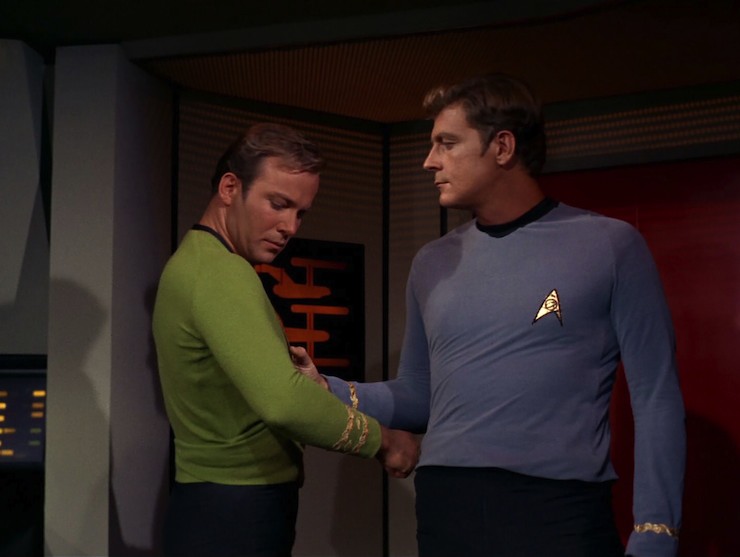
Norman’s next stop is the bridge. He informs Kirk that he has set up a trigger relay that will destroy the ship if they try to change course. Norman reveals himself to be an android—which explains why he didn’t report for his physical, as well as how he beat the crap out of everyone in sight—and he assures Kirk that “we” have no harmful intent, but they do need the ship. They’ll arrive in four days. When asked for specifics, Norman says, “I am not programmed to respond in that area.”
Then Norman simply shuts down, right in the middle of the bridge. He stays there for four days, crew members awkwardly moving around him, until they arrive at an uncharted planet, and then Norman wakes up. He informs Kirk that he, Spock, McCoy, Uhura, and Chekov will beam down to the planet. On the one hand, he says he’ll blow up the ship if they don’t beam down; on the other hand, he does say “please.”
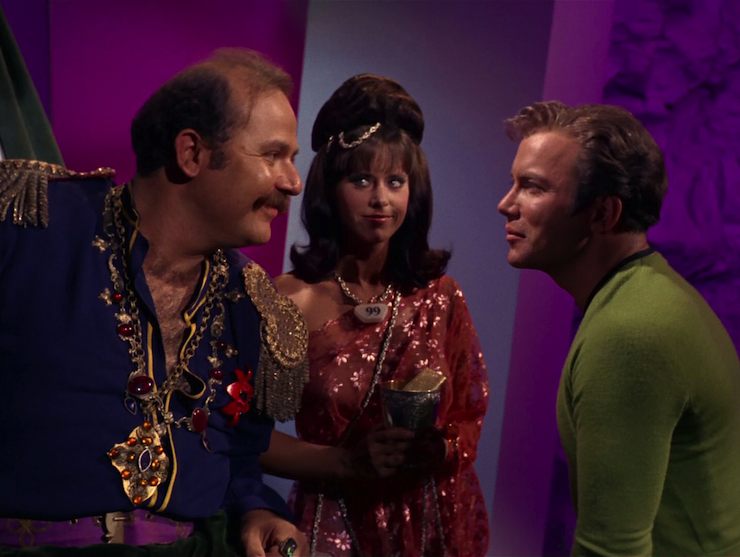
So they all beam down to an underground cavern, and are brought to the ruler of the world: Mudd the First, a.k.a. Harcourt Fenton Mudd. He is surrounded by four identical women, who are also androids (and all named Alice). Kirk is furious. He tries to call the Enterprise, but one of the Alices crushes the communicator with one hand.
Mudd explains that he organized a technical information service that brings technology to various worlds that need it—but without paying royalties on those patents. He sold a Vulcan fuel synthesizer to the Denebians, who then contacted the Vulcans. The penalty for fraud on Deneb V is death, so Mudd broke out of jail, stole a ship, and barely escaped—but not before the Denebians fired on him and damaged his navigational array. He wandered about for quite some time until he crashed on this planet, which includes two hundred thousand androids, all ready to serve his whim. But they also wanted to serve and study humans, and Mudd ran out of things for them to do, and they won’t let him leave. So he sent Norman off to fetch a starship captain and his crew. The androids can have four hundred people to play with and Mudd can finally leave the world.
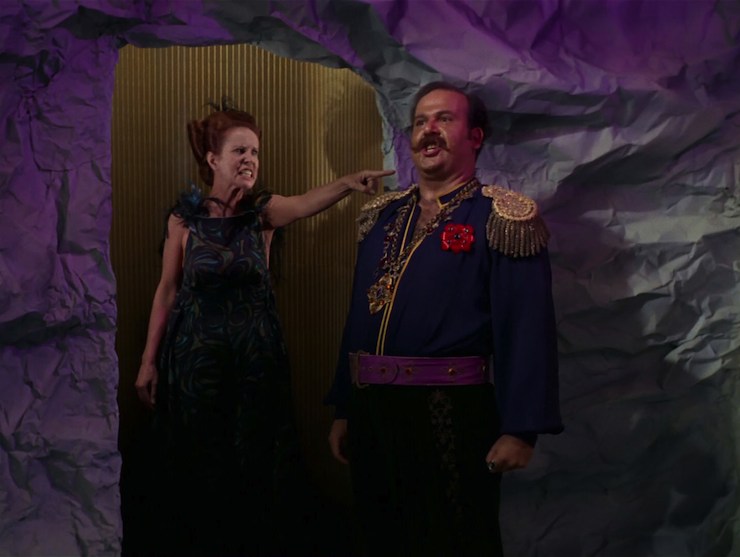
Mudd also reveals that he keeps an android version of his wife around, one who nags him just as the real one did (and who drove him out into space), but who shuts down when he says, “Shut up.”
Norman and two Alices show them to a common area with quarters nearby. Norman explains that their creators came from another galaxy, but their sun went nova, and most of them died. The only survivors were on remote outposts, like this one, but eventually they too died, leaving the androids without purpose or function. Mudd’s arrival gave them that function.
After the androids leave, the crew discuss their options, with Chekov, McCoy, and Spock all agreeing that they’re in a lot of trouble. Spock seems to think that there has to be a central control for the androids to direct their programming. Kirk tasks him with finding it, and tells the other three to look around and learn everything they can.
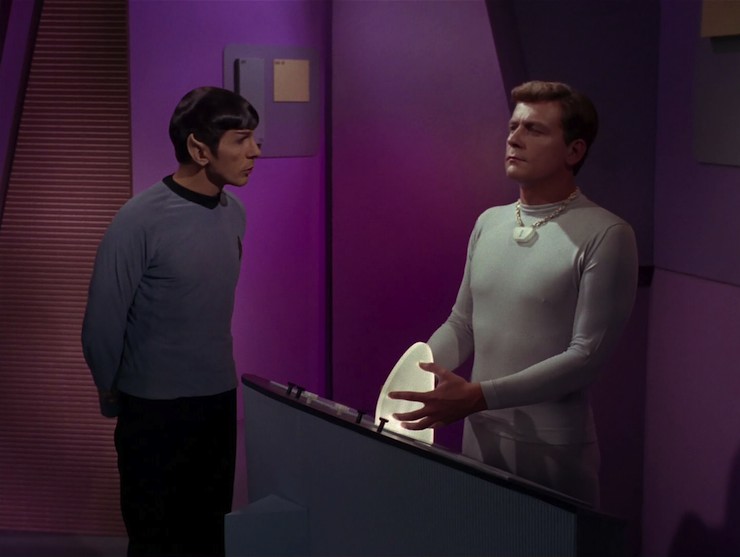
Spock quickly finds the control area, though he is skeptical of Norman’s claim that the simple relay station he’s standing in front of is capable of controlling all two hundred thousand androids.
Mudd shows Kirk and Uhura the place where the androids are created. The bodies are believed to able to last for five hundred thousand years (none of them have actually broken down yet), and Alice explains that they can transfer someone’s consciousness into an android body. Uhura is intrigued by the notion.
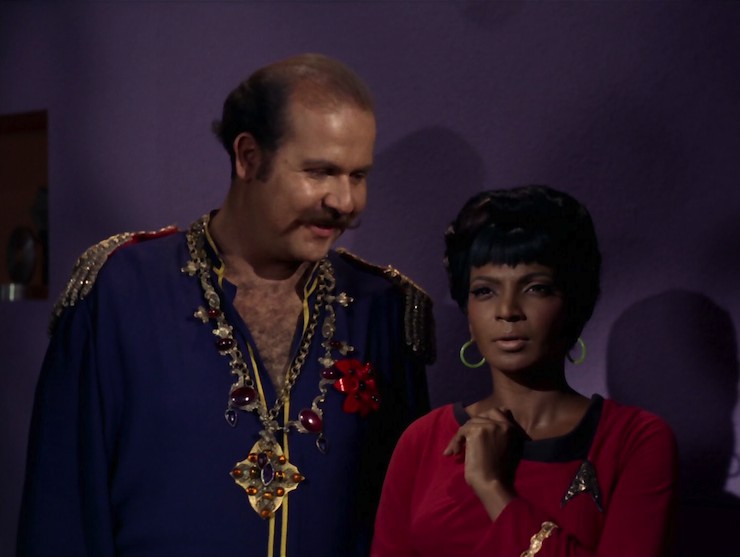
The androids beam up to the Enterprise and send down the entire rest of the crew, then take it over themselves. Kirk is furious, and tries to choke Mudd, before getting ahold of his temper. Spock agrees that the androids are loyal to Mudd, so they will act as his crew on the Enterprise, and he can probably stay ahead of Starfleet indefinitely, given that he’s got a top-of-the-line capital ship.
Spock also points out that the facilities here can provide people with pretty much anything they want instantly. That’s going to be a nasty temptation for the crew. As if to prove the point, we see Chekov being waited on hand and foot by two Alices, and Scotty gets access to a state-of-the-art engineering shop.
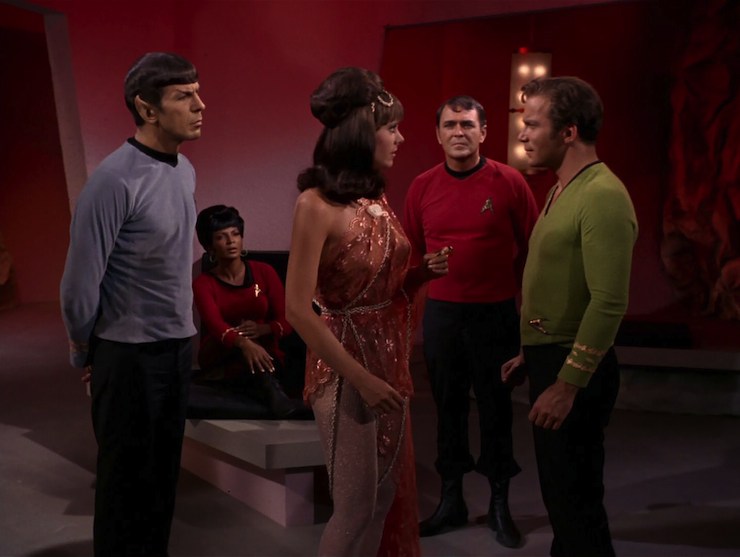
Kirk tries to ask Alice to give them their ship back, as that will make them happy—without it, they are unhappy. Alice is confused, as their needs are all being fulfilled, so they should be happy. Desire for the Enterprise confuses Alice (particularly when Kirk calls her a beautiful lady and says they love her), and she gets caught in a brief feedback loop, saying things like “illogical,” and “all units converge,” and “Norman coordinate,” before declaring the notion of unhappiness to be a silly goose and they must study it further.
When Mudd orders the androids to bring his bags to the Enterprise, they say “no” in perfect unison. They reveal that they knew Mudd was a weasel of the highest order, but they used him to gain knowledge. They have decided that people need to be taken care of and made happy by the androids in order to keep them from succumbing to their base instincts. By catering to them and taking care of them, they will keep them from being greedy and corrupt and warlike. It’s actually kind of practical in a holy-shit-that’s-scary way.
Our heroes (and Mudd) gather in the common area to figure out what to do next. Spock points out that there are hundreds of Alices, Maisies, Hermans, etc., but only one Norman. Given Alice’s “Norman coordinate” line, it’s possible that Norman is the true central brain for the androids. What they need to do is take out Norman—preferably with irrationality, as that seems to give the androids fits—and the rest will follow.
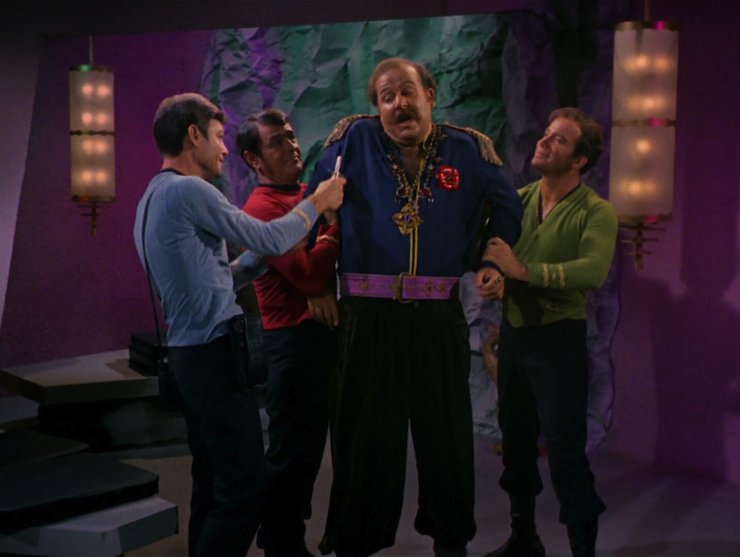
They enact Plan A, which involves sedating Mudd. Kirk then goes to Alice and asks for access to McCoy’s medical equipment in sickbay to care for Mudd, who is “ill.” Alice is directed to observe, and Kirk leads her to the common room, where McCoy is “examining” Mudd and says he’s dying.
Uhura then declares what they’re doing to be a trick, that they want to beam back so they can sabotage the ship. In exchange for this, Uhura wants an immortal android body. Alice refuses the request to go to the ship and promises Uhura that her android body will be ready by the time they leave.
As soon as Alice leaves, Kirk congratulates Uhura on her acting job. The androids were expecting the crew to try to escape, and now they have. They now enact Plan B.
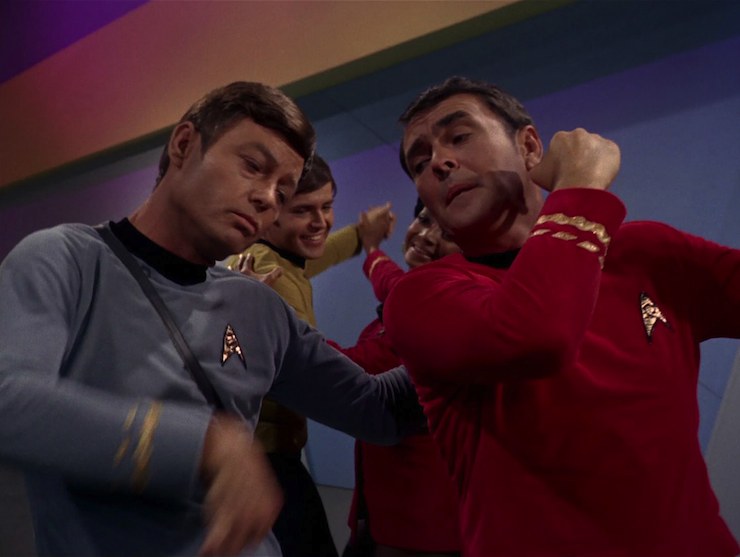
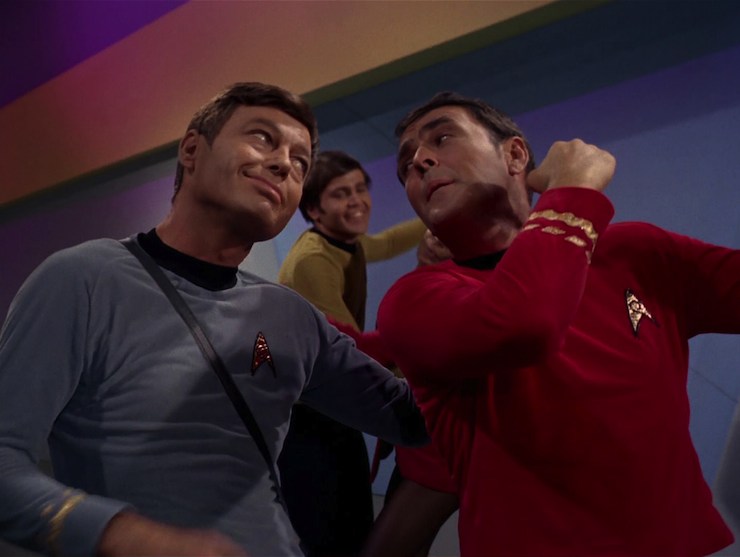
Kirk sits on Mudd’s throne, which summons the Alices. Kirk asks for their attention. Scotty and McCoy enter and bow to each other. They mime playing instruments while Chekov and Uhura dance. The Alices are confused as there’s no actual music (Kirk asks them how they like the music, too), and Kirk says they’re celebrating their captivity. Chekov then compliments Uhura on her dancing, in response to which she slaps him. Kirk explains to the Alices that she slapped him because she likes him. Kirk then orders Chekov to stand still, at which point he starts dancing.
The Alices shut down in a puff of illogic.
In the engineering lab, Spock discusses dimensional interfaces with two more Alices. And then he says that he loves Alice 27 but hates Alice 210, because they are identical. They too shut down in a puff of illogic.
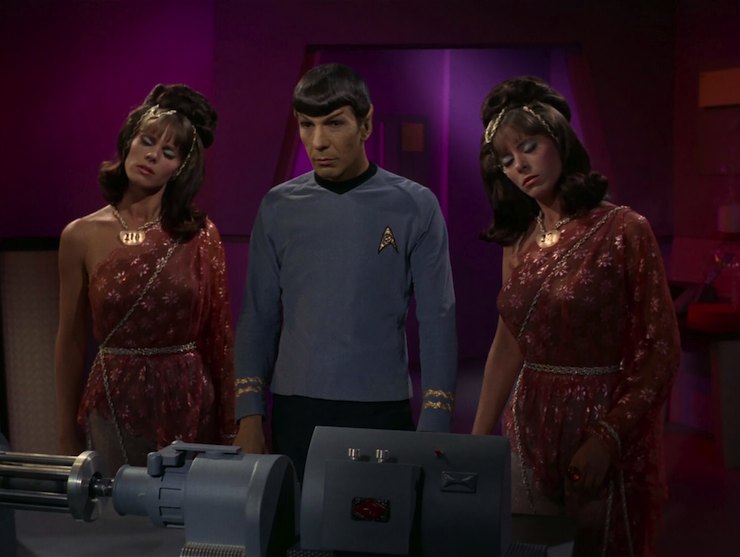
They head to the control center, where there are two more Alices as well as Norman.
Kirk asks Norman to surrender. Norman says that’s illogical, as they are stronger and faster.
The crew explain to Norman—in overly dramatic and very silly fashion—that humans require more than nourishment of the body, but also nourishment of the soul.
Confused and bewildered, Norman goes to Spock, hoping that he will explain this logically. In response, Spock says, “Logic is a little bird tweeting in a meadow. Logic is a wreath of pretty flowers that smells bad.”
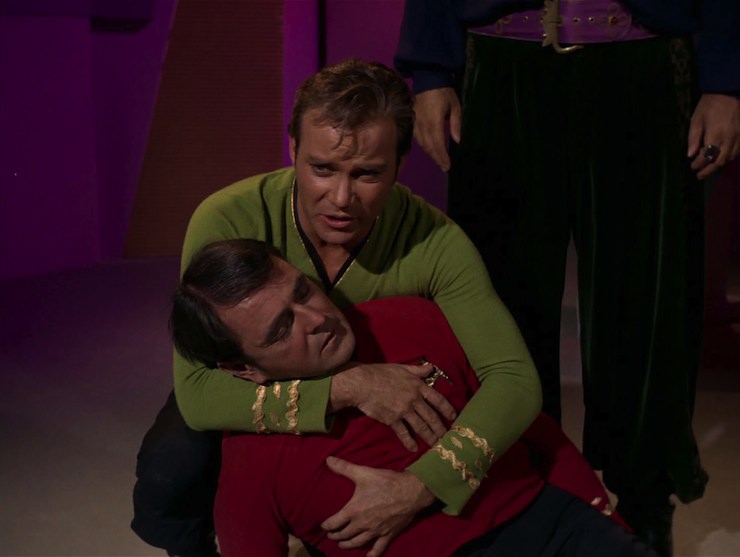
Scotty then does a dramatic death scene, declaring himself tired of happiness, comfort, and pleasure, so Kirk, Spock, and McCoy “fire” on him with their index fingers and silly sound effects. McCoy declares him dead. They laugh over his dead body and Kirk gives a speech about how important dreams are.
Kirk and Spock then mime putting an explosive together. Spock “throws” the explosive to Mudd, who mimes almost dropping it. Mudd then is handed several nonexistent items by McCoy, then he golfs the explosive, while everyone pretends to wince in pain from the noise of the explosion.
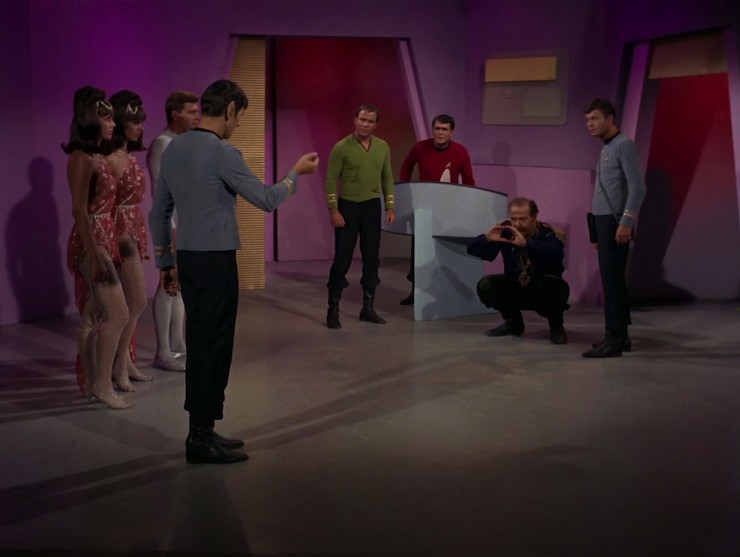
Two more Alices shut down in a puff of illogic. Kirk then tells Norman that everything Mudd says is a lie. Mudd then says he is lying. Norman is sufficiently mindfucked at this point that he can’t handle it and begs Kirk to explain. Kirk says, “I am not programmed to respond in that area.” And then Norman goes blooey.
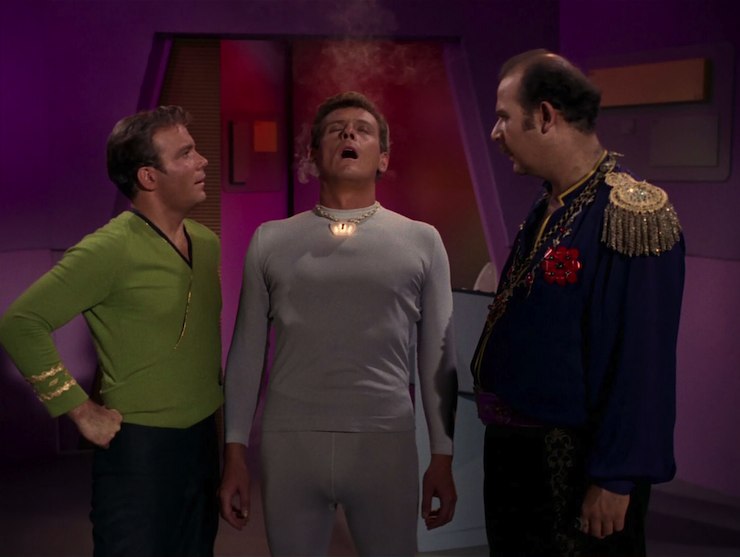
The androids are reprogrammed to their original function of getting the planet ready for colonization. Mudd is paroled to the android population as a human irritant, a perfect example of a human failure. He’ll stay there as long as he remains an irritant.
At first, Mudd thinks it won’t be so bad, given all the female androids whom he’ll be surrounded by. But then Kirk informs him that they’ve created a new series of androids specifically designed to cater to Mudd’s every need: Stella. Three of them (one of which is numbered 500) come out to nag the crap out of him as the crew beams back to the Enterprise.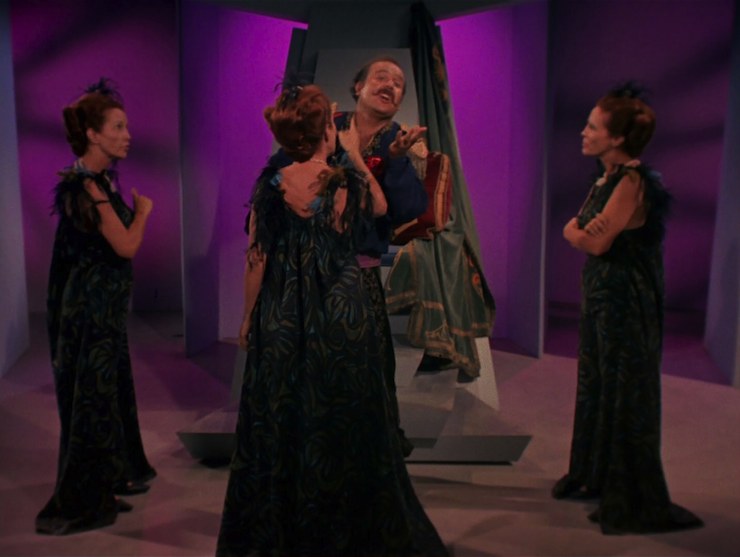
Can’t we just reverse the polarity? Spock says that androids “must” have a centralized computer that runs them, which makes no sense on the face of it. It’d be one thing if he said the way they spoke in unison indicated such a thing, but Spock speaks definitively as if that’s the only possible way an android could function, something that is belied by the previous use of androids on the show—the mechanical folk in “What Are Little Girls Made Of?” needed no central authority to control them—and later uses—Data, Lore, and Lal on TNG.
Fascinating. The androids gravitate toward Spock because he is logical and rational. Mudd sees this, too—at one point he says Spock will love it on Mudd’s Planet, because “they all talk just the way you do.”
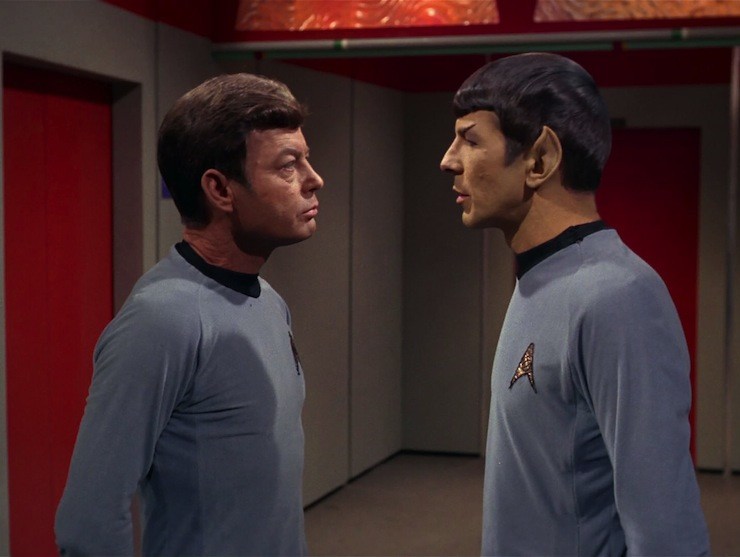
I’m a doctor not an escalator. McCoy sees a biolab that he says he could spend the rest of his life in. Which is kind of why the androids showed it to him.
Ahead warp one, aye. Sulu only appears in the early part of the episode on the Enterprise, not in any of the scenes on Mudd’s Planet. George Takei will be missing for the next ten episodes, not back until “Return to Tomorrow,” as he was off filming The Green Berets, a John Wayne film in which Takei played Captain Nim, a South Vietnamese military officer.
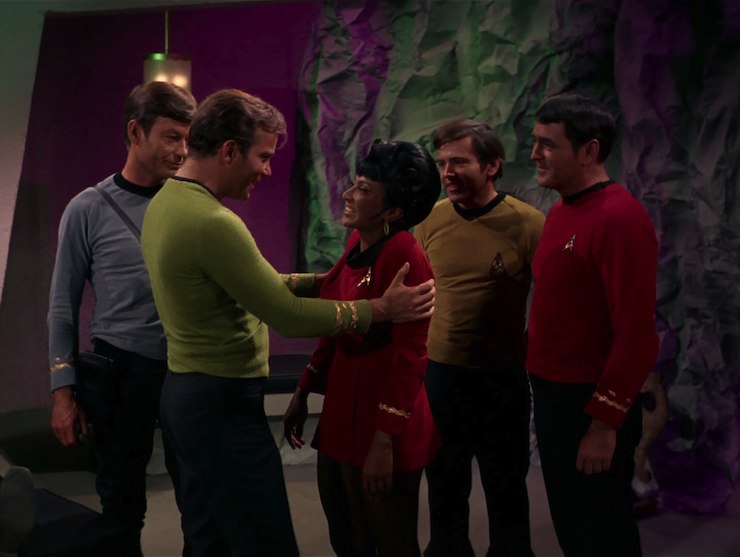
Hailing frequencies open. Uhura is obviously intrigued by the notion of eternal youth in an android body, but it’s only curiosity—when push comes to shove, she has no interest, but she fakes it enough to fool the androids.
I cannot change the laws of physics! Scotty does a particularly horrible death scene. Then again, he has actually died once before…
It’s a Russian invention. Chekov describes Mudd’s Planet as “even better than Leningrad.” Of course, the city stopped being called that in 1991, returning to its original name of St. Petersburg (the name the city had between its founding in 1703 and 1924, when it was renamed after Vladimir Lenin following his death).
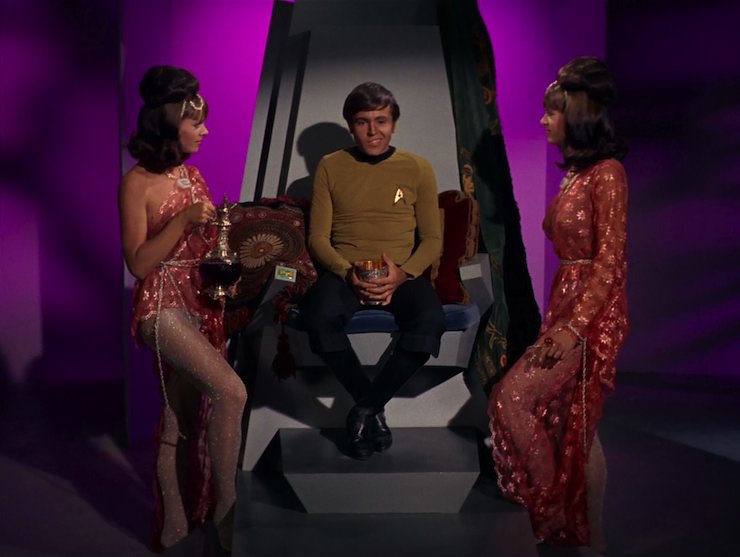
No sex, please, we’re Starfleet. The Alices make it clear to Chekov that they are fully functional, and also that their sexual subroutines (they don’t use those words, as it’s 1967) were programmed by Mudd himself. Wah-HEY!
Channel open. “I am not programmed to respond in this area.”
The most used line in the episode.
Welcome aboard. Roger C. Carmel makes a triumphant return as Mudd, having previously been seen in “Mudd’s Women.” He’ll be back in “Mudd’s Passion” on the animated series.
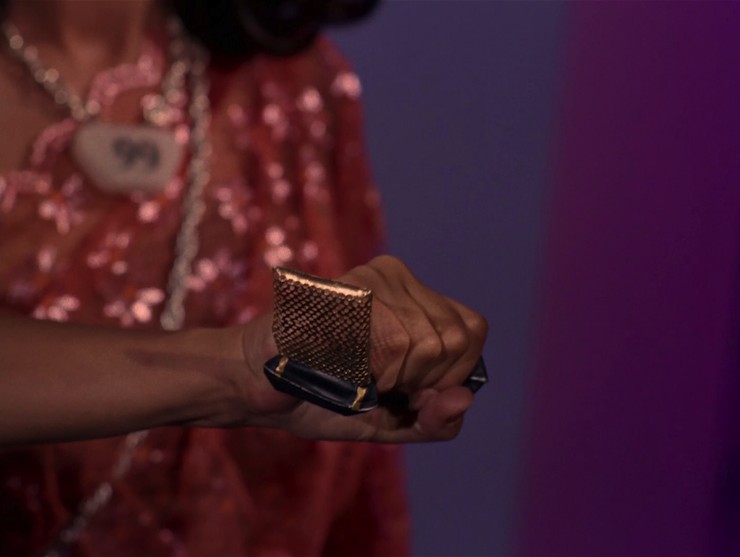
The various series of androids were played by twins in order to simplify the filming process and cut down on the number of effects shots needed (and also to enable those shots to have more people in them). Alyce and Rhae Andrece play the Alices, Ted and Tom LeGarde play the Hermans, Colleen and Morreen Thornton play the Barbaras, and Starr and Tamara Wilson play the Maisies. Richard Tatro plays Norman, while Kay Elliot plays Stella.
Plus recurring regulars George Takei, Nichelle Nichols, James Doohan, and Walter Koenig are all present, alongside Mike Howden and Michael Zaslow as other Enterprise crew.
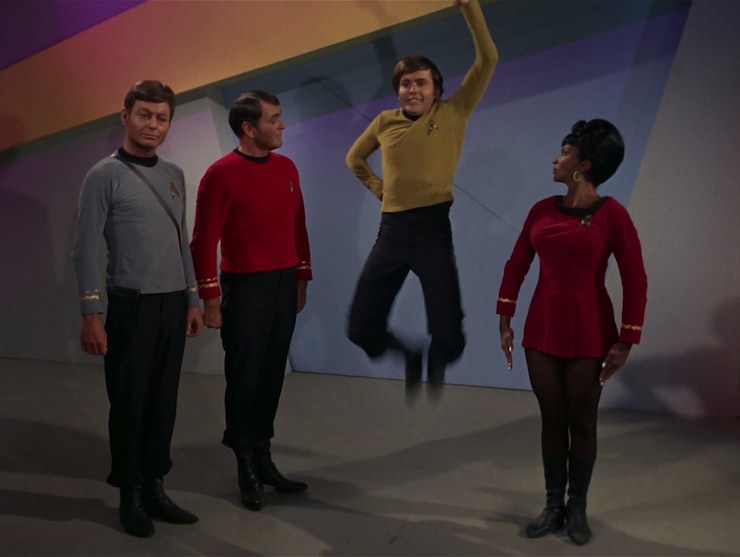
Trivial matters: This is the first sequel in Trek history, as this is a followup to “Mudd’s Women,” and the first time we’ve seen a one-time guest star make a return engagement.
David Gerrold did an uncredited rewrite of the script. He was actually offered co-scripting credit, but Gerrold declined, preferring to let Stephen Kandel—who created Mudd—keep all the credit (and concomitant residual monies).
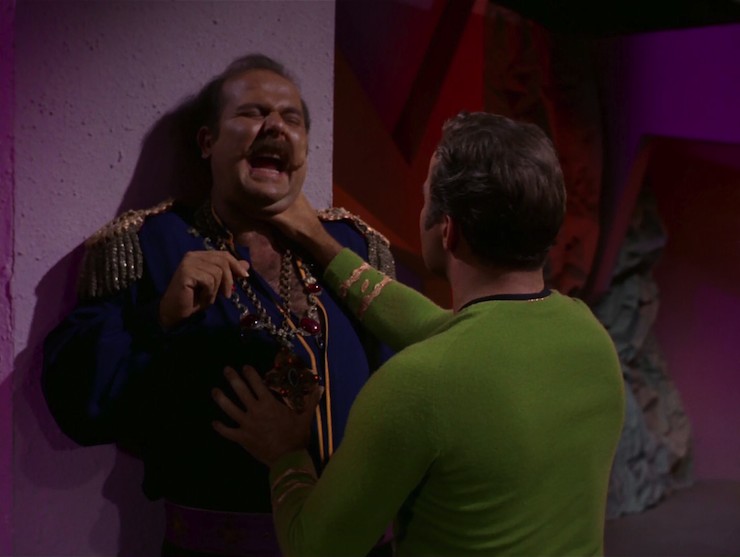
The title, like pretty much every like title, up to and including TNG‘s “I, Borg,” was inspired by Robert Graves’s seminal novel I, Claudius.
The 2006 remastering of this episode had one of the more peculiar changes: the closeup of Norman’s “belly flap” opening to reveal his circuitry was replaced with what the CGI programmers probably thought was a more sophisticated control panel. But the new one doesn’t look any more or less ridiculous than the old one, and is honestly one of several reasons why I don’t even bother with the remastered versions, as far too many changes are unnecessary and pointless.
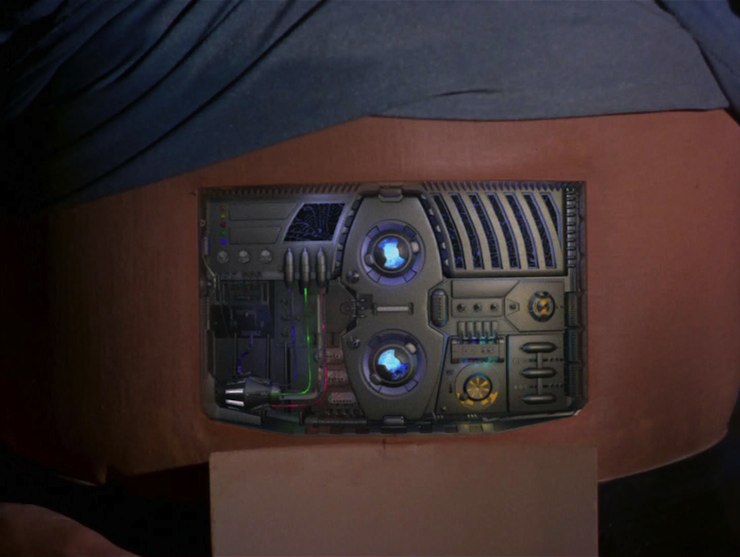
This, along with “Mudd’s Women,” was not adapted in any of the collections of adaptations of episodes, mostly by James Blish, but rather in a separate volume called Mudd’s Angels by Blish’s widow J.A. Lawrence, which adapted the two live-action Mudd episodes and also had an original novella featuring Mudd called “The Business, as Usual, During Altercations.” Among other things, the novella established that the real Stella was actually much worse than her android counterpart…
To boldly go. “Harcourt Fenton Mudd!” This episode is why Mudd is well remembered as a character, and it’s entirely on the back of the uncredited David Gerrold. I mean, we don’t know precisely what was Gerrold’s rewrite and what was in Stephen Kandel’s original script, but we also have Kandel’s other scripts and Gerrold’s other scripts, and it’s Gerrold whose dialogue tends to crackle and snap and have magnificent comic beats.
And it’s the dialogue that makes this episode shine like a big giant shining thing. Roger C. Carmel owns the role of scoundrel, and the entire episode is worth it for the scene where he explains what happened to him since last we saw him, and Kirk “translates” for him. Indeed, Carmel and William Shatner make a superb double act throughout most of the episode.
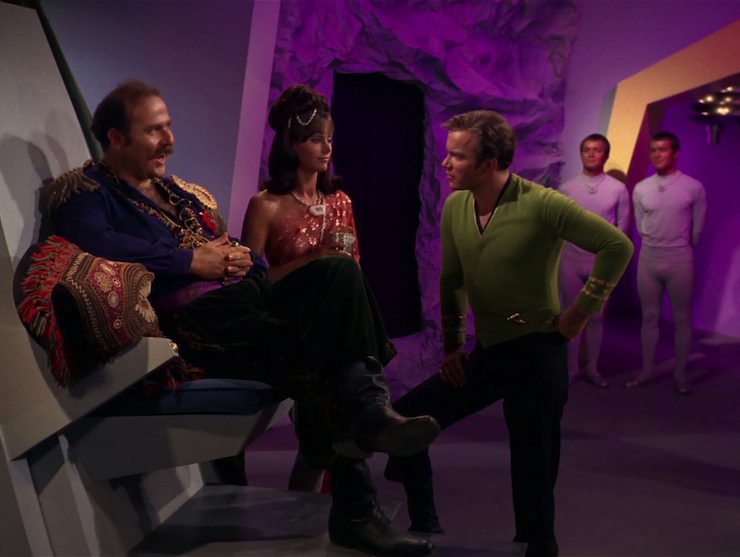
Of all the Kirk-makes-the-computer-go-blooey episodes, this is my favorite because the crew hits Norman and the others with one thing that really might make a computer put its little feet up and go “urk!” and that’s insane humor. Because that’s such a subjective, such a ridiculous thing that I can actually almost believe that their looniness made them all short-circuit. (Certainly, more than I believe the absurdity of “The Return of the Archons” or “The Changeling“…)
I also like that Spock is right in the middle of the craziness, and he does so beautifully, best seen in his superb delivery of the “smells bad” line. For all that he tamps down his emotions and thinks logic is just the jinkiest, Spock has had a sense of humor from jump, seen as early as his recommendation that Bailey have his adrenal gland removed in “The Corbomite Maneuver,” not to mention his “beads and rattles” line to McCoy at the top of this episode.
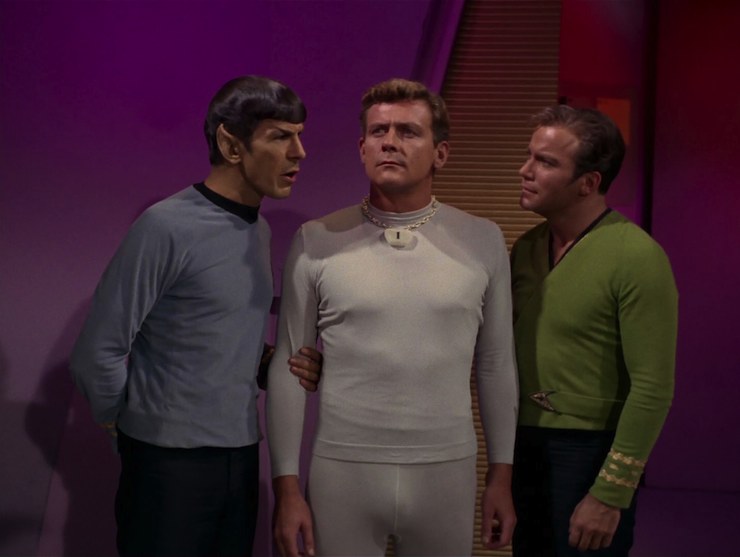
Not only is the episode genuinely hilarious, with the snappiest dialogue this side of “The Trouble with Tribbles” (gawrsh), but underneath the guffawing is a good science fictional concept: the servants who care for people so much that they become indolent—or prisoners. The androids’ plan is an insidious one, and the bland monotone in which Norman spells it out makes it more so.
The episode’s only flaw is 100% a byproduct of being produced in 1967, and for all that a shrill voice screaming “Harcourt Fenton Mudd!” has become a Trek staple, the character of Stella Mudd is pretty much everything that is wrong with popular culture’s portrayal of women in the 20th century. Mudd’s shuddering whining about his nagging shrew of a wife may have gotten laughs for Carmel in 1967—and for Henny Youngman in the 1940s—but it just makes the episode look dated and awful now.
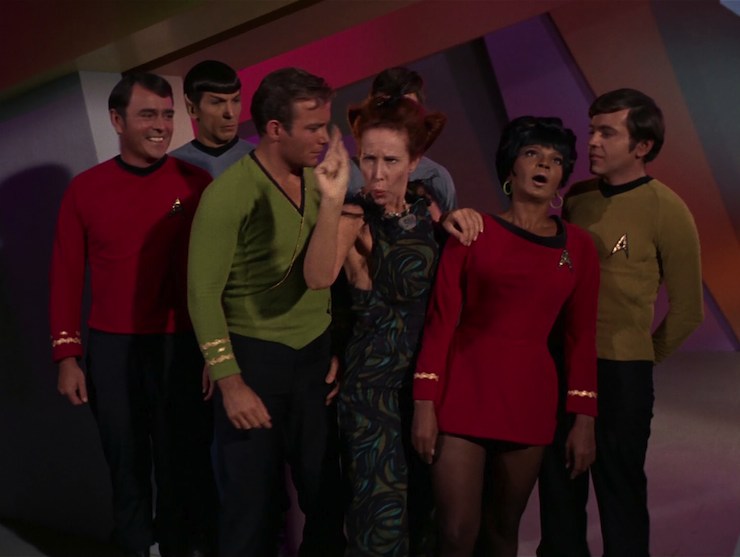
Not enough to ruin it, of course, but still a blight on the episode that is otherwise delightful.
Warp factor rating: 8
Next week: “The Trouble with Tribbles”
Keith R.A. DeCandido will be at Arisia 2016 this weekend in Boston, Massachusetts, along with guests of honor John Scalzi, Johnna Y. Klukas, Pablo Miguel Alberto Vazquez III, and Venetia Charles. His full schedule—which includes a tribute to Leonard Nimoy panel—can be found here.










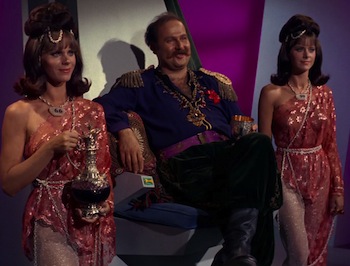
“Scotty does a particularly horrible death scene. Then again, of all the people on the planet, he’s the only one who’s actually died once…”
Not necessarily true, McCoy was killed and resurrected in “Shore Leave” in the first season.
Ah, “I, Mudd”: for my money, it’s the best comedy episode from the original series. Great stuff. Grade: 8.
Mixed feelings about this one. The performances and humor are fun, but it’s a pretty insubstantial episode in a lot of ways. It’s got kind of an antiquated view of computers and AI, with the androids being so stupid and limited. I realized some years back that they aren’t even independently intelligent, just drone bodies operated by the single computer mind, with Norman as their “Borg Queen,” the central coordinating node. So the claim that a human brain could be put in one of the android bodies is a bit incongruous.
The gender attitudes are also quite antiquated — not just the shrewish stereotype of Stella, but the emphasis on Uhura’s vanity as the basis for her temptation, and the premise of Mudd surrounding himself with an enormous harem of animated sex dolls.
The plot of this episode probably owes a lot to Jack Williamson’s 1947 story “With Folded Hands…” and its novel version The Humanoids. That’s the seminal work about ultra-efficient service robots taking over the world to keep humanity safe and secure, in obedience to their overarching rule to serve people and protect them from harm — which, as it happens, they call “the Prime Directive.” “With Folded Hands…” is basically what would’ve happened to Earth if Mudd’s androids had gotten there a few centuries earlier.
This episode also features a partial original score by Samuel Matlovsky (whose most significant other credit is as the second most prolific composer for Flipper), veering between blatant sitcom music and avant-garde weirdness. It’s not only Matlovsky’s sole contribution to ST, but it’s the only TOS episode score that was virtually never recycled as stock music in later episodes (I think maybe one cue from it was reused in one other episode, and that’s it), because it just didn’t really fit anywhere else. It’s by far my least favorite TOS score. However, it was one of the first bunch of TOS episode scores to be released on audio, on Volume 2 of Label X’s LP releases of newly performed suite arrangements of TOS scores, back in 1985.
St Petersburg was renamed the more Slavonic sounding Petrograd in the late Tsarist period to reflect a growing anti German feeling in the Russian Empire at the turn of the twentieth century. I know, I’m sorry to be a pain, and no one likes a smartass. :)
Apparently the highest ranking individual in an organization going on dangerous away missions is a law of nature in the Star Trek ‘verse. If Norman is so important to the android society’s basic network functioning, why did they send him to fetch the Enterprise, how did the rest of them function while he was away? Would another unit have worked at all?
I wonder if Spock thinks that he could program an android OS that would not be vulnerable to such ridiculous tactics of logic.
There seems to be a lot of civilizations that have the death penalty.
This is a fun episode, but it has some plot points that do not stand to close examination.
Ken: I didn’t want to get into that, and it was still basically the same name only de-religious-ified.
EC: Crap, I forgot about that. Will fix……………
—Keith R.A. DeCandido
Surely The Menagerie is the first sequel in Star Trek history? Or if you don’t count that since The Cage wasn’t actually released to the public at the time it came out, then The Menagerie, Part 2 at least. I think I know what you’re getting at with that description of this episode (since there’s definitely a difference between a sequel in this vein and a sequel that’s basically a long-firm clip show and a sequel that’s the second part of a two-parter), but this episode would be better described as the first original reprisal, wouldn’t it be?
Edit: Well, wait, no, I suppose I’ve never actually heard the second part of a two-parter described as a sequel. But I’m not entirely sure why, since I’ve definitely heard the second part of a two-part movie series described as a sequel. Hm. I wonder what the connotative difference is in those two situations? Because yeah, reflecting on it, the first TV example doesn’t really “feel” like a sequel but the second movie example does.
Language is neat.
@7/Idran: Technically, part 2 of a serialized movie (like Harry Potter and the Deathly Hallows or The Hobbit) should not be called a sequel — in the same way that a single story told in three installments (like The Hobbit) should not be called a trilogy. It’s just one story cut into pieces. But since most followup movies are sequels — i.e. separate stories that revisit the characters or ideas from the first one — the terminology has gotten blurred.
And then there are a lot of sequels that retroactively present themselves as direct continuations, that take a complete story and reposition it as part 1 of a larger whole story, e.g. the Back to the Future sequels. Which also blurs the lines. But the difference is whether they were planned as a single whole at the same time (like BTTF 2 & 3 vis-a-vis each other) or added later to a previously complete original work (like BTTF 2 & 3 vis-a-vis the original BTTF).
Mudd, and both the android and human versions of Stella, also make another appearance in Jerry Oltion’s Mudd In Your Eye. Not only is the original Stella worse, upon spending time with one or the other of them, Kirk reflects that maybe stranding Harry with 500 copies of her may have been a little harsh.
I will just point out that the trope of a nagging shrew of a spouse exists for a reason, and that reason is just as true today as it was in the 1960s. The flaw in how it was portrayed back then is just in that it was limited to women being portrayed that way. In reality it can go both ways, and it’s not a fun place to be. (And that is all I shall say about that.)
I love this episode! Despite rather weak premise, it’s funny and entertaining. A lot of credit should go to actors, that’s another episode well done all around.
I liked Kirk being cheerfully mean, not only when he’s “translating” for Mudd but also “go to sleep” scene, and his gleeful “I am not programed to respong in that area” always cracked me up. Spock’s “fascinating” after he deals with to Alices is brilliant. And even Mudd is not annoying here unlike he was in Mudd’s Women.
And of course all this silly illogical acting they do is great and as Keith said it’s much more believable way to make AI overload and crash.
I even found Stella funny but maybe it’s because of personal experience. For the last 30years we’ve had those neighbours and every time I see them wife is telling her husband off – how useless he is and how he fails at everything. Wether he did something, didn’t do something, said or didn’t say something or other doesn’t matter, she’s just going on and on and on about him. So when I saw Stella I just laughed, so familiar it was.
And by the way, there is still Leningrad Region in Russia, it wasn’t renamed when the city went back to being St. Petersburg, so Chekov’s phrase is not entirely outdated :)
@9/Jason: I thought that was a bit of a wasted opportunity – it would have been funny if the original Stella had turned out to be perfectly nice and sensible. After all, it can’t be fun to be married to Harry Mudd.
Concerning Leningrad, when I showed this episode to my eleven-year-old and explained the name change to her, she suggested that maybe they changed the name again in the centuries in between.
@12/JanaJansen: I can see your point, but I have to disagree: it probably would be fun to be married to Harry. For about a week—after all, this is the same book where Kirk imagines that he and Harry could be friends, or at least drinking buddies, in other circumstances. But only a week; after that the lying and womanizing and general hijinks would start to get old fast. No wonder Stella keeps trying to “improve” him: she just wants some peace!
@3. Hmm. Maybe transferring a human(oid) brain is what’s supposed to make the androids self-sufficient –if the centrally-controlled drones are just a sort of “autopilot” mode because they don’t have an implanted onboard intelligence. Maybe Norman is the only one who can operate independently.
These androids (some of the same individuals, I believe) and Mudd himself also reappear in Jeffrey Lang’s TNG novel “The Light Fantastic.”
#9: And both Mudd and some of the androids — along with a good many other memorable characters from various parts of Trek history — turn up in Jeffrey Lang’s The Light Fantastic, whose central characters are ST:TNG’s Data and a certain incarnation of one James Moriarty. (Lang’s Data-centric novels are among my very favorites among the modern-era Star Trek line; he does an outstanding job of balancing thoughtful idea-driven plots with strong characterization and a real sense of wide-eyed wonder.)
One time when I watched this episode as a kid my mother heard the nagging of the three Stellas at the end and called it a “fugue” (the musical tern).
I meant “term.” (aak!)
Jason: I covered Mudd’s tie-in fiction in “Mudd’s Women.”
—Keith R.A. DeCandido
You know…I don’t hate Stella. Yes, she is a horrific stereotype of the shrewish woman. But I think she is applied well as Mudd’s wife. When you consider who he is, personality-wise, it’s amazing he’s married to her. It makes me want to know more. Was it an arranged marriage? Was she always like that? Was he always like that? So I think she is a useful device; if we have to have such a thing, at least she serves a purpose.
I enjoy this episode, sexism notwithstanding. But my biggest question about the plot is the one David Morgan-Mar raises in his webcomic version of this ep on his Planet of Hats website: How the heck did Norman get on the Enterprise as an officer in the first place? As D M-M says, “it’s some seriously deep undercover work to get on board Enterprise as an impostor Starfleet officer.” Did he sign up years ago and serve on other ships to attain the rank of lieutenant…avoiding physicals all the while? Or did he stash the real Norman in a closet and assume his identity? Or did he hack into Starfleet’s computerized records and create a Starfleet identity for himself, plus an assignment to the Enterprise, either as an additional crewman increasing the total number of crew on Enterprise by one (seems unlikely to go unnoticed) or by reassigning someone else who *was* supposed to be assigned to the Enterprise?
Stella is what Mudd portrays his wife as being. Given Mudd’s version of how he wound up on this planet vs Kirk’s translation, I think we can assume the real Stella would be different (sorry, novels!).
@21/Ellynne: Yes, that’s what I was thinking too.
@20/Saavik: I like your last suggestion best.
He was sent by Mudd, and Mudd hasn’t been on the planet for years, so he can’t have signed up years ago. If there had been a real Norman, that means he must have hacked into the computers anyway to find out about him. It’s probably easier to create a new record than to put someone in a closet.
Even though it was first published in 1947 the novelette by Jack Williamson doesn’t seem dated. I highly recommend it to the readers of this forum.
I love this episode. Everything about it works for me, as I don’t need to analyze every detail of the plot. I can just enjoy the ride, laughing from start to finish. I always look forward to this pair of fun episodes, with “The Trouble with Tribbles” a great twofer.
This episode is why Mudd is well remembered as a character, and it’s entirely on the back of the uncredited David Gerrold. I mean, we don’t know precisely what was Gerrold’s rewrite and what was in Stephen Kandel’s original script, but we also have Kandel’s other scripts and Gerrold’s other scripts, and it’s Gerrold whose dialogue tends to crackle and snap and have magnificent comic beats.
Gene Coon is supposedly also behind a lot of the snappy dialogue, including this episode’s.
I, Mudd works beautifully. You can tell the actors enjoy cutting themselves loose. I can’t think of a more outrageous fourth act solution than having these people put out a stage performance. Of course, the highlight has to be the no-nonsense way Spock bends the conventions of logic to confuse these androids. And for once the cliché of talking a droid to death works because we’re not supposed to take any of this seriously. I mean, just look at Norman’s face when he literally starts smoking!
Unlike By Any Other Name, which desperately tries to create a rather phony sense of threat out of a very similar plot device, I, Mudd works.
The shrew wife is one hell of a dated stereotype, but it got me laughing nonetheless, if only because Harry Mudd deserves every bit of it.
I’m currently going through the Animated Series. While I enjoy a lot of those episodes, Mudd’s Passion doesn’t even come close to this one.
I am distracted by Norman’s bulge.
I am distracted by Norman’s bulge!
Hahahah!
That picture of Chekov on the throne, along with all the other scenes of Pavel with various ladies in these episodes – while the captain either turns from potential romance or else faces up to old could-have-been loves that he opted not to pursue for the sake of duty – leads me to one simple conclusion…
… [accent] our modern conception of James T. Kirk as swaggering lothario is a Russian invention! [/accent]
Harry Mudd is not a reliable narrator about anything, including Stella.
Someone (maybe Phil Farrand?) pointed out: don’t the androids really mean “I am programmed NOT to respond in that area”?
@31/Majicou: No, I don’t think so. It’s not that they’re deliberately keeping secrets or something, more that they don’t have the subroutines in place to tell them how to react to that particular question. It’s an error message, like “Syntax error” or “Bad command or file name.” They just don’t have an answer because they’re too limited to understand the question. They’re basically like characters in a modern computer game. They may have a limited artificial intelligence that lets them react to a range of possible stimuli, but feed them something outside the areas they’re programmed to respond in, and they won’t be able to give a response beyond “I don’t understand.”
Years before I became a tried-and-true Trek fan, my family would occasionally have reruns of some of the classic Trek episodes on TV in the background (as well as the first-run TNG). Some of my earliest Trek memories are Commander Riker (with, as I later came to learn, the power of Q) granting Geordi LaForge eyesight, the whole episode of Arena, and the end of The Corbomite Maneuver, as well as various other TOS episodes. However, the end of this episode (The “Everything he says is a lie.” “I’m lying to you.” mindscrew on Norman) may well be my earliest Star Trek memory. It sticks with me some 30 years later.
How did Norman (and his bulge) come to be on the Enterprise in the first place? And who controlled Mudd’s androids in his absence?
@34/Scott: “How did Norman (and his bulge) come to be on the Enterprise in the first place?” – Comment #20 suggests several possible ways.
“And who controlled Mudd’s androids in his absence?” – Perhaps no one. They all fell down and only got up again when the Enterprise arrived.
Since Harry is responsible for the appearance and programming of the Stella android, and probably for all of the female androids that we see, an easy way to redeem this episode’s only major flaw is to conclude that it’s not the episode that’s sexist, it’s Harry.
If you’d had the bad luck and poor judgment to marry Harcourt Fenton Mudd you’d become a shrew too. If ever a man deserved to be nagged to death it’s our Harry.
No. No matter how awful someone is, nobody should stay married just to nag the other part.
Granted @38.
Note we have only Harry’s side of his marriage to Stella. It is very probable she is NOT the hatchet faced nag he depicts her as. After all Harry is practically the definition of ‘unreliable narrator’. And God knows Harry Mudd is no prize in the relationship department.
That’s a good point.
@3/CLB:
I think Harry Mudd keeping a harem like this is entirely within his character, though, haha.
I’m not the biggest fan of this one and I’d probably give it a 7, although I could still see myself leaning towards an 8 on the strength of its comedic timing; Carmel and Shatner do make a great double act! In many other ways, though, the plot could stand some scrutiny.
I must admit that the ending is a great “let their hair down” bit of stage acting! In fact, it feels a lot like an exercise in an acting class. Indeed, I’ve taken a few acting classes in my life and the climax in this episode has a very familiar vibe for me.
But Uhura wasn’t actually tempted. Sure she played the the idea when it was proposed to her, for maybe five minutes, then dismissed it until they were making their plans and trying to decide who would be the traitor.
“How about me, Captain? I could pretend to want that Android body they talked about.”
“Think you could make it convincing?”
“Watch me!”
princessroxana: Yes, but the fact that her act was convincing is due to a yucky view of women as creatures of vanity.
—Keith R.A. DeCandido
If I’m remembering right the crew were all being tempted. With Chekov it was girls, girls, girls. For Uhura it was eternal youth and beauty, which to be honest is pretty tempting. It would have been better though to have the offer of Android bodies made to all. Eternal youth looks good to men too.
@44/roxana: Yes, but the point is what they were tempted by — the men by sex, the women by being sexy. That’s the double standard of the era, the assumption that men wanted to sleep with women and women wanted men to want to sleep with them. Which is pretty obviously asymmetrical.
Sounds complimentary to me. The difference seems to be Chekov wanted a willing harem while Uhura was tempted by being personally irresistible. Maybe because she’s already very beautiful and desirable and used to men falling all over themselves for her, and Chekov – isn’t.
@46/roxana: Yes, the fact that it’s complementary is THE WHOLE POINT — both the men’s and women’s desires are in service to men. That’s what makes it so obviously sexist, that its writers couldn’t imagine a woman desiring anything for herself that wasn’t about being alluring to men.
It’s a shame we didn’t get to see more of Harry Mudd until the animated series and some later novels. But I have to ask, wasn’t stranding him on the planet a violation of Federation law, basically keeping him there without trial until he escaped? I also found it disappointing that we never got to find out what happened to the androids in the Next Generation era; I would have to imagine that Data’s creator knew about them and might have used them as models for Data.
mspence: We were actually working on a story for the Starfleet Corps of Engineers series that was going to involve the Mudd androids in the 24th century, but the line was cancelled before we could do it.
—Keith R.A. DeCandido
@48/mspence: “I also found it disappointing that we never got to find out what happened to the androids in the Next Generation era; I would have to imagine that Data’s creator knew about them and might have used them as models for Data.”
I find that very unlikely. These androids were far too crude to be models for Data. They didn’t have any independent intelligence; they were just drones operated by a single central computer (Norman), and that computer was extremely limited in its intelligence and responses. There’s no way the Mudd androids were actually sentient. Even a holodeck NPC can emulate intelligence and adapt to unexpected inputs better than they could.
The only TOS android that operated on Data’s level was Rayna Kapec. And the novel Immortal Coil established that Noonien Soong was a student of Flint, her creator.
I’ve been watching Star Trek: Discovery since CBS started showing it on their regular network, and then coming here to read krad’s reviews. Since last night’s episode was a Mudd-centric one, I followed a link from that review to this one. And as it happens, I also recently started watching season 10 of Doctor Who, of which the second episode, “Smile” (slight spoilers, though most of what I’m about to say can be deduced in the first five minutes) also revolves around robots that were sent ahead to prepare the way for colonists, and took their mandate to keep the colonists happy a bit too far. I wonder if the writer of that episode was inspired by this one.
This was so much fun! I now see this plot influenced a few others down the line with the idea of a shady character appearing to rule over people working to keep them totally happy only to be reaching out to an enemy for help (or to replace the shady character). A few years back I read a My Little Pony: Friendship is Magic IDW comic with that exact plot (for those familiar with the characters, Rainbow was Kirk, Trixie was Mudd and the Diamond Dogs were the androids). The climax with the “illogic” has to be one of the funniest scenes in the show. Pop culture likes to mock the acting of The Original Series but episodes like this show just how good they really were!
I avoided this one for awhile, despite its good reputation. My thought was that Star Trek isn’t often successful at its attempts at comedy and especially being of the ‘60s, I wouldn’t even get the “dated” humor. But you know what, it turns out my trepidation was all for nought. This episode was legitimately funny because it was so over the top, particularly that sequence where the main cast is acting (and dancing) illogically to make the androids short circuit. The cliché of Kirk talking to computers/androids until they go kablooey is so well known that I just knew he would employ it in this episode and he did not fail to disappoint! And it was no less humorous either. I especially like the fact that a bunch of the rest of the cast also get to short circuit the androids with their silliness. My favorite moment that made me laugh was Shatner’s line delivery early on in the episode where he shooed away one of the Alice’s and went “bup, bup, bup, bup, bup.” It was sublime! I think I may actually find this episode funnier than “The Trouble with Tribbles” with the latter installment being more “cute” than especially funny.
@53/garreth:
My favorite moment is Kirk translating Mudd’s nonsense… “He broke jail; he stole a spaceship; they FIRED on him!”
Roger Carmel is a delight in this episode.
” Spock says that androids “must” have a centralized computer that runs them, which makes no sense on the face of it. It’d be one thing if he said the way they spoke in unison indicated such a thing, but Spock speaks definitively as if that’s the only possible way an android could function…”
Spock made the comment “this many androids,” so I think he could deduce from the sheer number of less-sophisticated androids that the 200,000 needed something like traffic control or task assignment. (If self-driving cars become the norm, they may also have a central computer they will have to connect to.) The androids from “What are Little Girls Made of” may or may not have been more sophisticated, but at least there were fewer of them, so a central control system may not have been so necessary.
I found this episode, to use a phrase, illogical.
First, you have Mudd’s idea to steal the Enterprise. He says he’ll get away with it because “that ship as fast as any other.” There are, what? 10 other Constitution-class starships. He honestly thinks he can outrun them all? Starfleet Command is going to start looking for their rogue starship.
Then you have the androids’ plan to protect the humanoids of the galaxy by coaxing them to stay planet-side. That would never work in the long term for the reasons Kirk says!
Another annoying thing is Kirk asks Mudd how he evaded arrest and Mudd never answers the question. He starts talking about how he was trying to bring technology to backwater worlds… Now, I surmise that he was initially tasked to do that as community service (before he took advantage of it), but it would’ve been nice to get a direct answer.
Finally, the use of non-logic to short circuit the androids just didn’t work for me here. I didn’t have a problem when they did it to Landru or Vaal but here–the attempts were so silly. It didn’t seem plausible that the androids would short circuit due to those illogic games.
I did kind of feel sorry for Mudd at the end. I know it was done for humor and I did find it cute years ago when I first saw–but I don’t find him being surrounded by shrewish androids to be funny now.
@57/Mary
Silliness is kind of the point, this being an episode indented for laughs.